Most people see nothing but dry earth out here, but Nevada agates are hiding everywhere. You just need to slow down long enough to notice what the sun is trying to show you.
A patch of gravel or a wash might look plain until a spark of light gives it away. Once that happens, every rock around you starts to look suspiciously interesting.
These stones often rest where water once flowed, worn smooth over time. They’re patient things, waiting for wind and curiosity to bring someone close.
Once you figure out where to look first, you’ll start finding them more often than you expect. A single good day in the desert can build a collection worth talking about.
What is Nevada Agate?
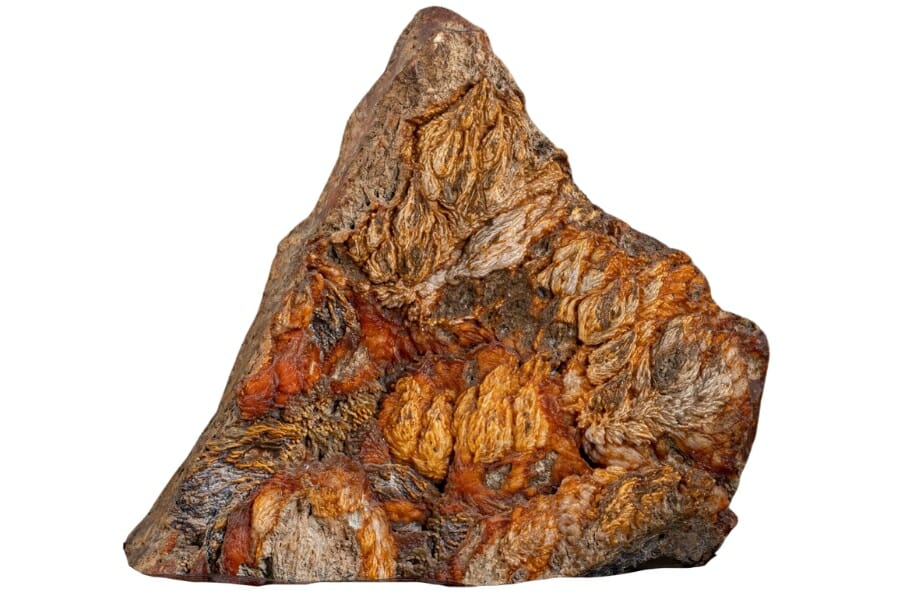
Agate is a type of quartz and a cool stone. It often has swirls of different colors inside it. These shapes aren’t just for looks; they tell you about the stone’s history, like how old it is or what kind of place it formed.
Most of the time, you can find agates in places with volcanic rocks or where there was a lot of volcanic activity in the past. Also, they’re in places where water flows, like rivers and streams (water carries tiny minerals, helping create agates).
Agates like to hide and seek in dry river beds, along the shore, or even in deserts where volcanoes used to be. They’re natural treasures hidden away until someone finds them.
Read our article to find out more about how much agates are worth.
Blue Lace Agate
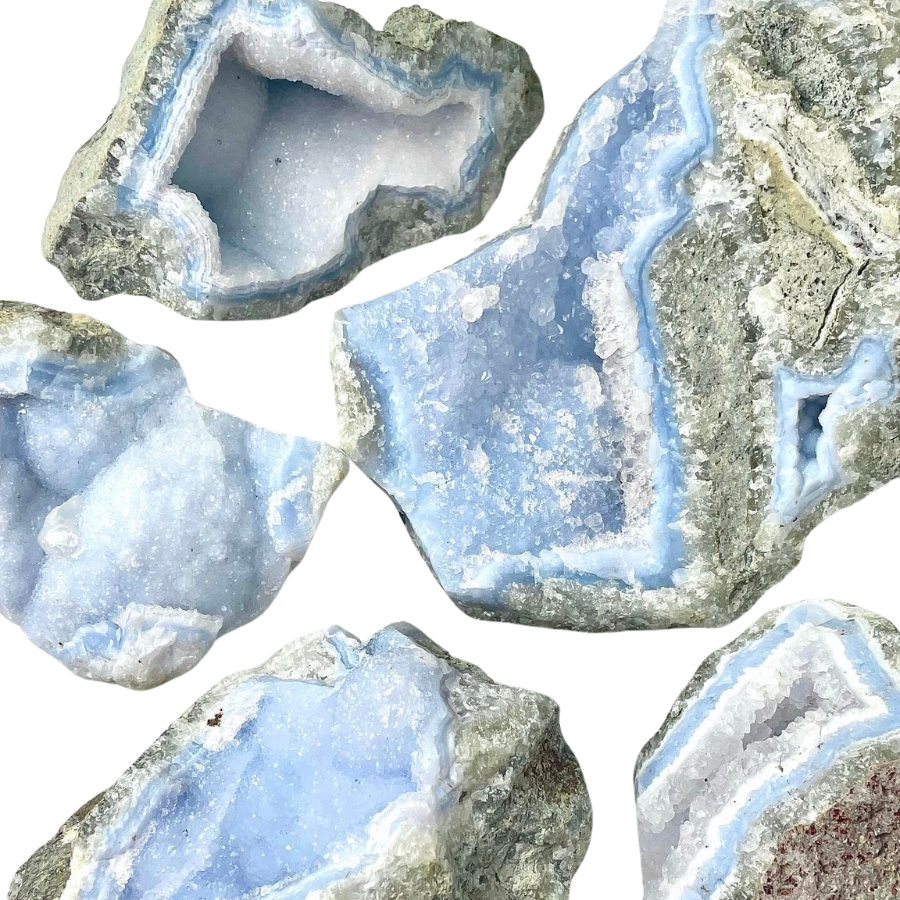
Blue lace agate is like the soft, sky-blue waves with lines that swirl and twist like delicate lace.
Its pattern comes from slow-forming layers of quartz, which create those beautiful, lace-like bands.
The bands of this agate type are often in shades of light blue, white, and sometimes a bit of grey. It’s different from other agates, which usually have more intense colors and stronger patterns.
The value of blue lace agate lies in its soft, tranquil look and the feeling of calm it brings. It’s often used in jewelry or as a decorative stone.
If you want REAL results finding incredible rocks and minerals you need one of these 👇👇👇
Finding the coolest rocks in isn’t luck, it's knowing what to look for. Thousands of your fellow rock hunters are already carrying Rock Chasing field guides. Maybe it's time you joined the community.
Lightweight, mud-proof, and packed with clear photos, it’s become the go-to tool for anyone interested discovering what’s hidden under our red dirt and what they've already found.
Join them, and make your next rockhounding trip actually pay off.
What makes it different:
- 📍 Find and identify 140 incredible crystals, rocks, gemstones, minerals, and geodes across the USA
- 🚙 Field-tested across America's rivers, ranchlands, mountains, and roadcuts
- 📘 Heavy duty laminated pages resist dust, sweat, and water
- 🧠 Zero fluff — just clear visuals and straight-to-the-point info
- ⭐ Rated 4.8★ by real collectors who actually use it in the field
Moss Agate
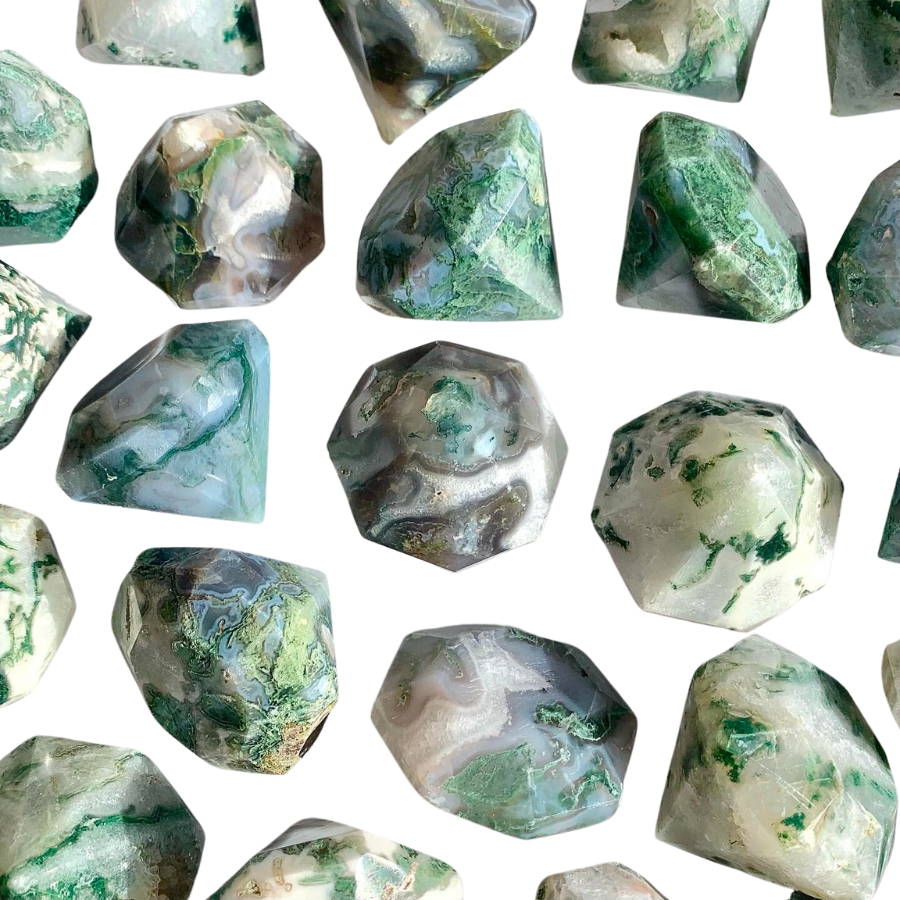
Instead of having the typical banding for which the different types of agates are known, moss agate has green inclusions that look like moss or trees.
These green patterns aren’t real plant material, though. They’re minerals like chlorite or iron oxide.
In some cultures, this type of agate is known as the “gardener’s stone” because of its green, plant-like appearance. It’s believed to help plants grow.
The price of moss agate can vary. It’s often quite affordable, but the more distinct and picturesque the green patterns, the more it might cost.
Fire Agate
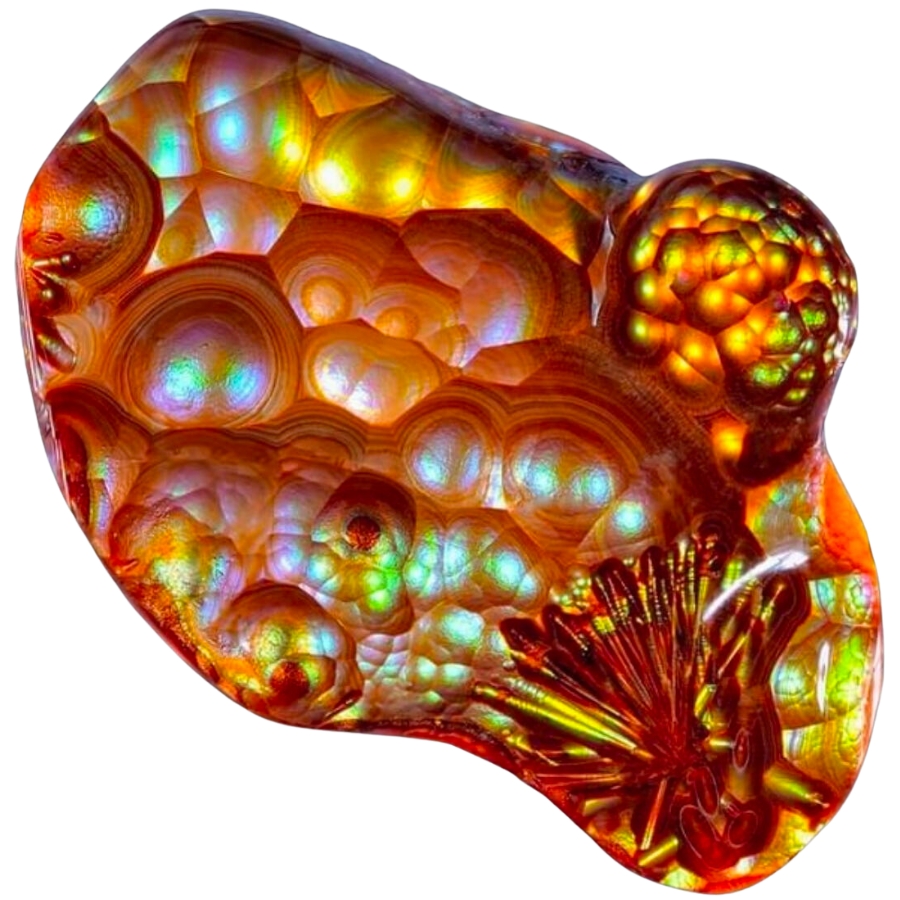
Fire agate is known for its incredible colors and the way it sparkles like fire. It’s got layers of silica and iron oxide that reflect light, creating a fiery effect.
When you look at fire agate, it’s like seeing flames trapped inside. Its colors can range from reds and oranges to greens and golds, all shimmering under the surface.
You might be wondering, “What is fire agate worth?” Well, its value comes from its rare beauty. The more color and sparkle, the more valuable the stone is.
Its fiery iridescence and lively play of color are used in jewelry pieces that are meant to stand out.
Dendritic Agate
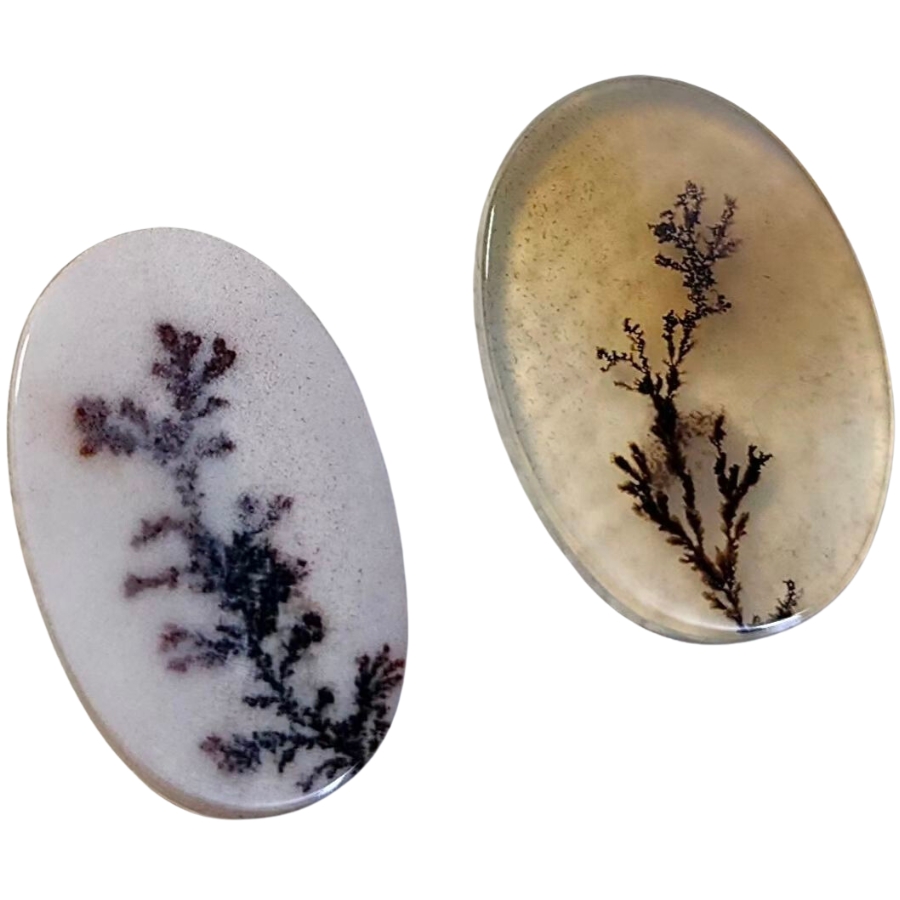
Dendritic agate is known for patterns that look like tiny trees or shrubs. Like moss agate, these patterns aren’t actual plants. They’re made of minerals, mostly manganese or iron oxides.
When you look at a dendritic agate, it’s like peering into a miniature forest or a frosty winter landscape.
The base of the stone is usually translucent to opaque, and the “dendrites”— those tree-like patterns— are often black or brown.
When it comes to how much dendritic agate is worth, it can vary. The more detailed and distinct the patterns are, the more it’s usually valued.
In some cultures, dendritic agate is believed to bring fullness and richness to life.
Crazy Lace Agate
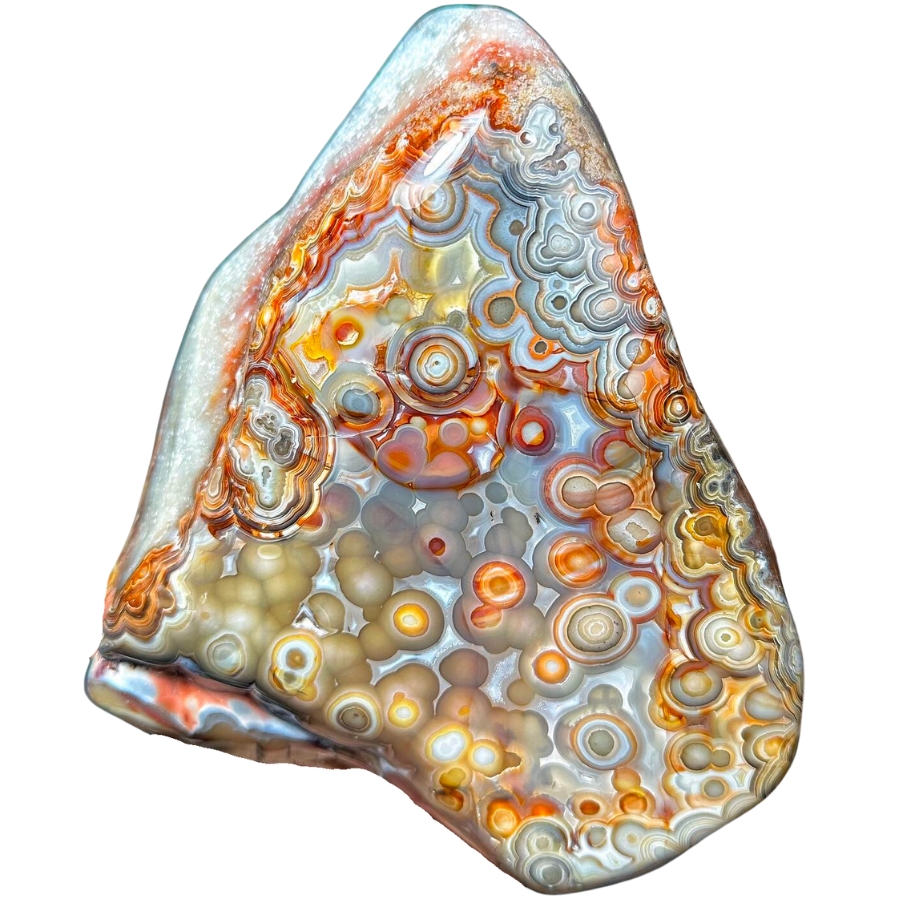
Crazy lace agate is like a party in a rock! It’s got swirls, circles, and all sorts of wild patterns dancing across it.
Its colors can be a mix of red, orange, yellow, and brown, and sometimes even a bit of gray or white.
What makes crazy lace agate stand out is its vibrant and complex patterns. No two pieces are the same. This distinctiveness is a big reason why it’s so valued.
Despite its wild and ‘crazy’ appearance, it’s sometimes called the “Laughter Stone” or “Happy Lace” because of the joy and positive vibes it’s believed to bring.
Laguna Agate
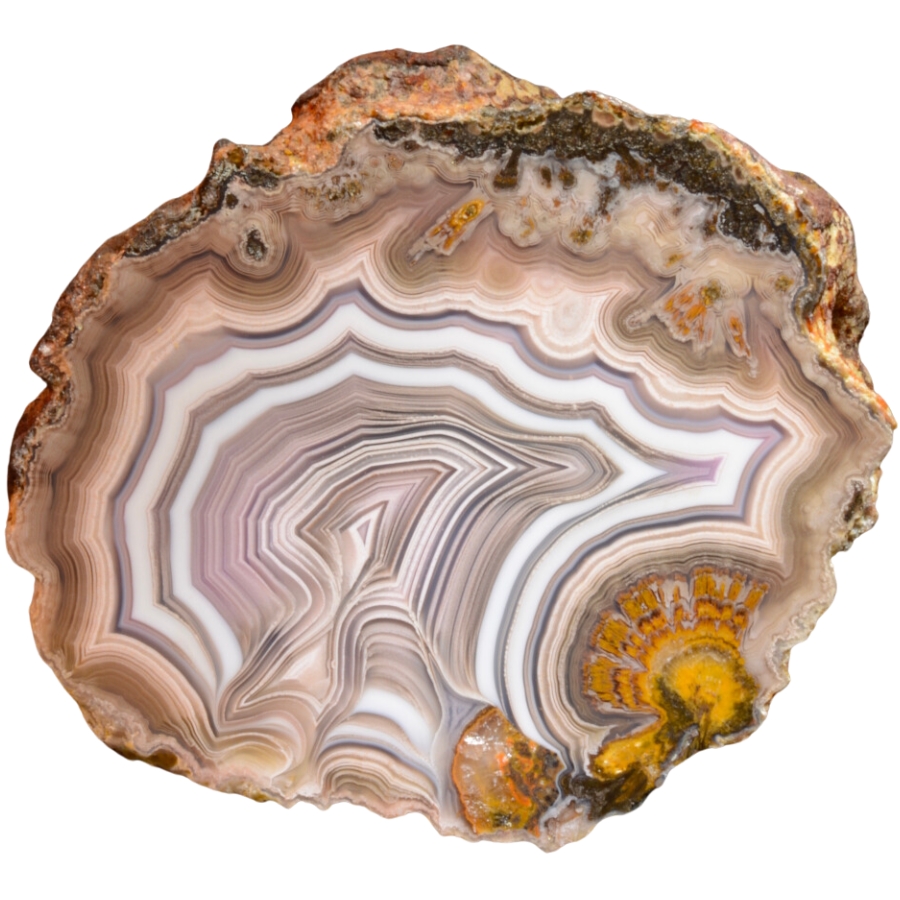
Laguna agate has incredibly sharp and fine banding. It has layers of red, orange, pink, yellow, and sometimes even purple and white all stacked in neat, tight bands.
These bands can form eye-catching patterns, like swirls, loops, and even landscapes.
The different colors of its bands come from various minerals present in the water at the time of its formation.
Laguna agate is considered one of the finest agates in the world due to its exceptional banding. This high regard among agate varieties makes it a prized possession for collectors.
Condor Agate
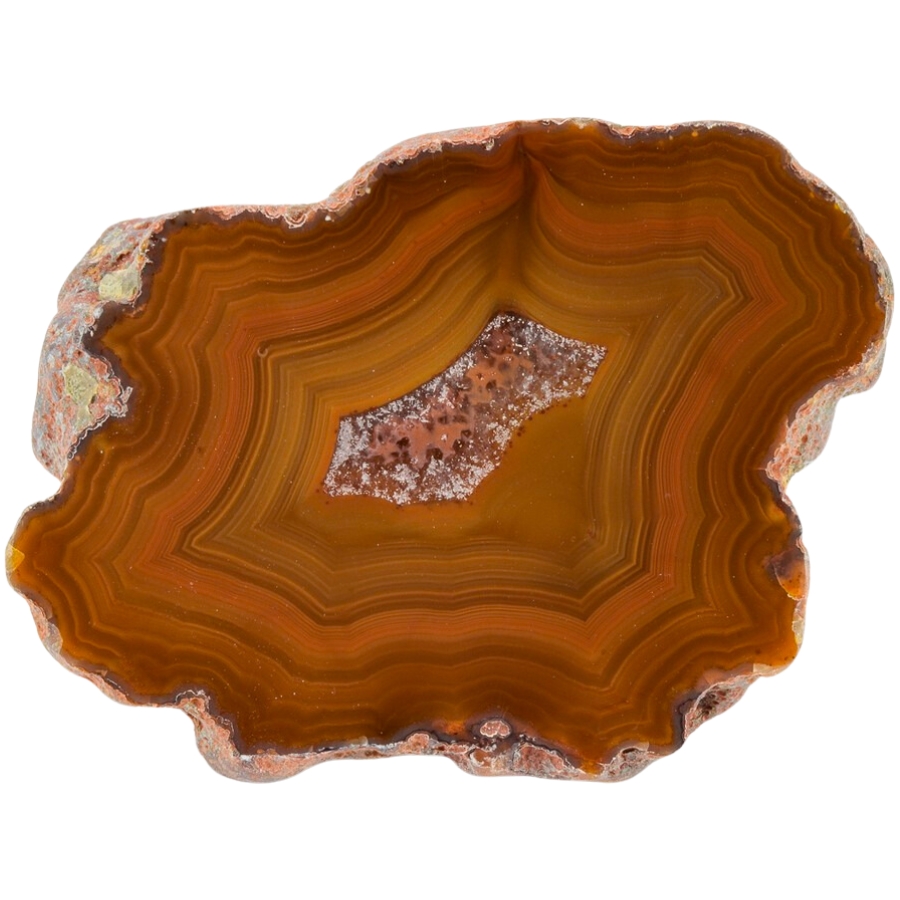
Condor agate is a real standout. It’s known for its bright, vivid colors and complex patterns.
It has reds, oranges, yellows, and sometimes even blues and greens all swirling together. These colors form in bands or in more random, artistic patterns.
The intensity and variety of its colors is what makes condor agate so special. It’s often used by artists and craftsmen who want to make a statement with their work.
Condor agate’s bold colors and patterns can turn a simple piece of jewelry or art into something really eye-catching.
Fortification Agate (Banded Agate)
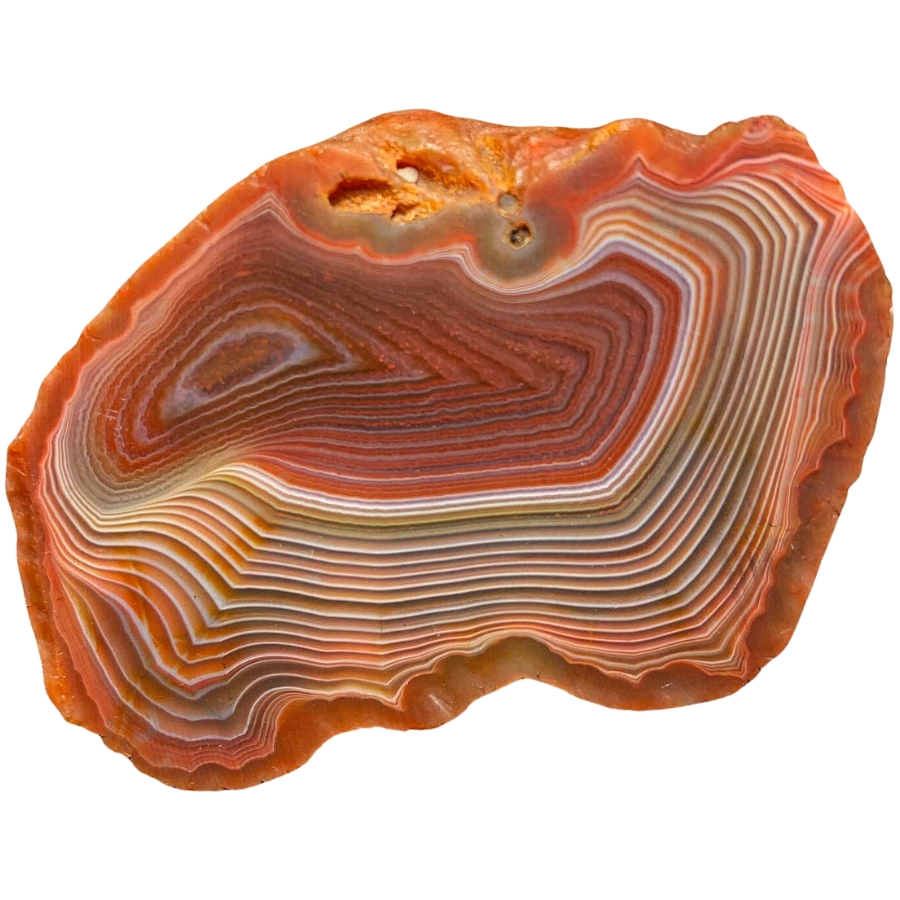
Fortification agate gets its name because the patterns inside it look like the aerial view of a fortified city.
Imagine seeing bands of color forming shapes that look like walls, with sharp angles and curves. They are usually in different colors, making each layer stand out.
If fortification agate is valuable, it’s because of its distinct patterns and colors. Its unique look makes it sought after for jewelry and as a collector’s item.
The clearer and more defined the patterns, the more valuable the stone can be. Some people also believe it can help with relaxation and calmness.
Iris Agate
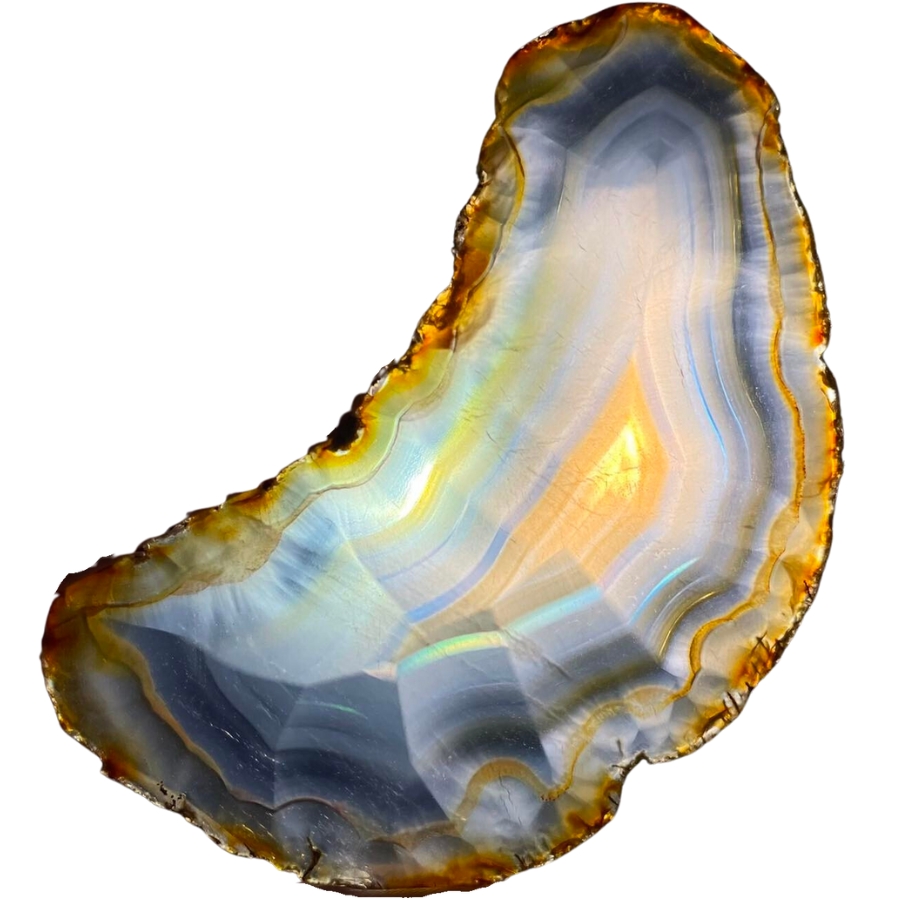
Iris agate looks like a regular agate at first, but when you hold it up to the light, something amazing happens. It shows all these rainbow colors, like light passing through a prism.
This is because it has very thin layers of silica, and when light hits these layers, it splits into all the colors of the rainbow.
The formation of iris agate is similar to other agates, but its layers are super thin, which is what creates the rainbow effect.
The value of iris agate comes from its unique ability to show these colors. In the past, people even used to think it had magical properties because of the way it showed colors. They saw it as a stone of good luck and wonder.
Plume Agate
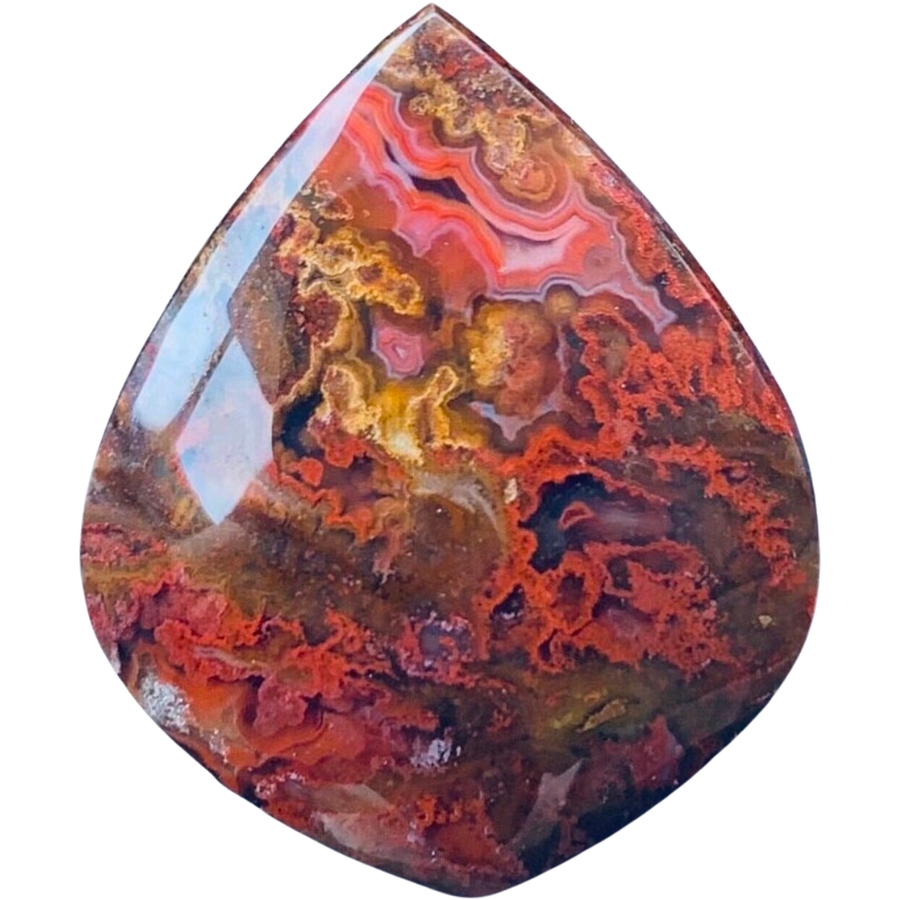
Plume agate gets its name from its patterns that look like soft, feathery plumes. These plumes can be in all sorts of colors: red, black, green, or yellow, set against a translucent or opaque background.
The way these plumes seem to float in the stone makes it look like a frozen underwater scene or like feathers caught in a breeze.
The plumes are made of minerals like manganese or iron oxide, which get trapped in the silica during the agate’s formation and create the feathery patterns.
The price of plume agate can vary depending on how clear and intricate the patterns are. The more detailed and colorful the plumes, the more the stone is usually worth.
Picture Agate (Scenic Agate)
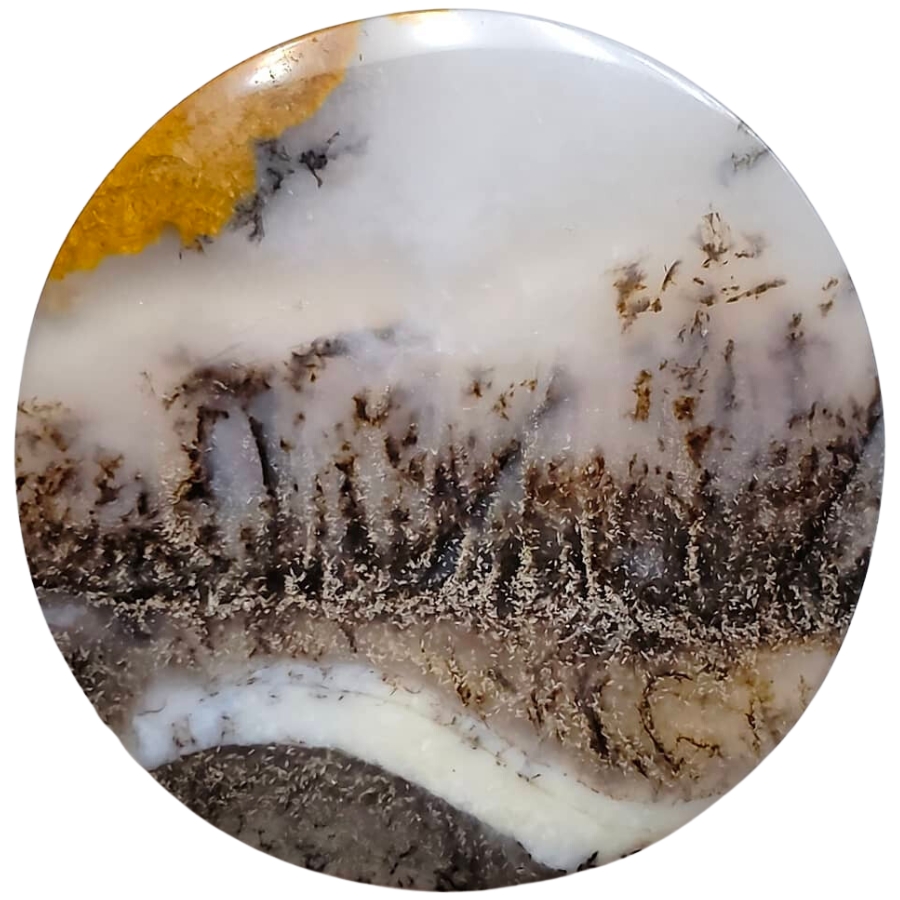
Picture agate is like a snapshot of nature captured in stone because it looks like it has pictures or scenes right inside it.
These “pictures” are actually natural patterns that resemble landscapes, mountains, trees, or even skies. They are usually in different shades of brown, white, and gray against a more translucent background.
The different patterns in picture agate or what’s also called scenic agate are made by various minerals in the water filled with silica that forms it.
If you’re thinking, “What is picture agate worth?“, its value comes from how distinct, clear, and detailed the natural “pictures” are.
Turritella Agate
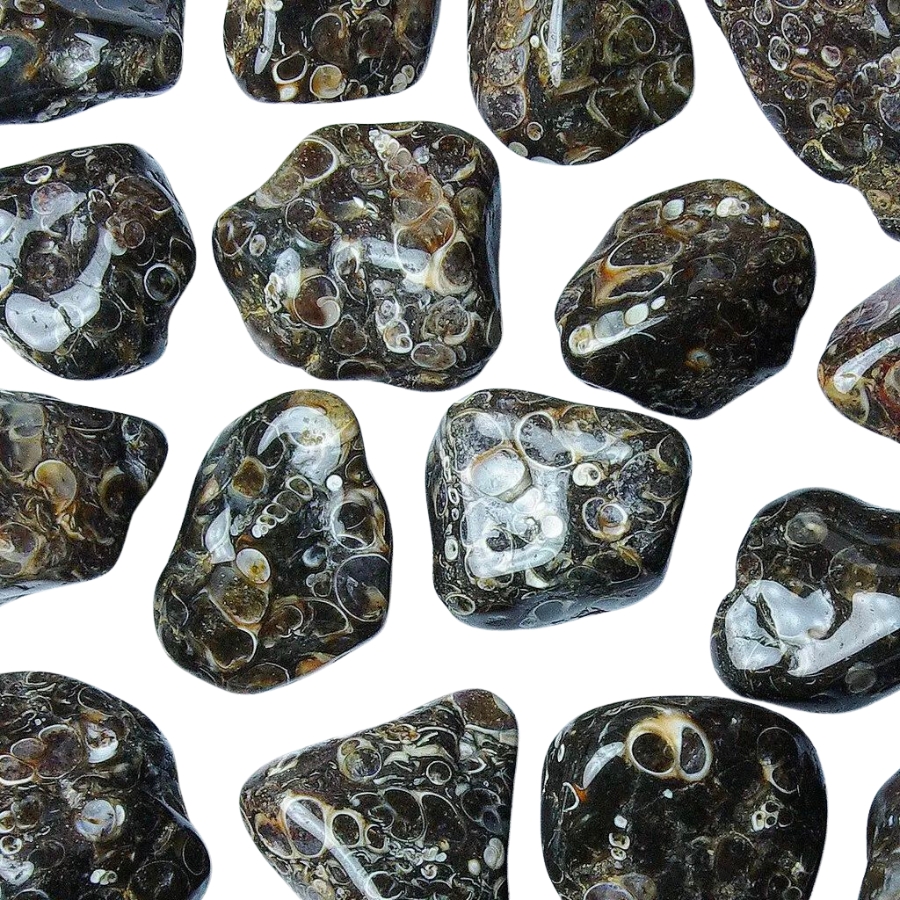
Turritella agate is not your typical agate because it’s full of fossilized snail shells! The shells belong to a creature called Turritella, a type of sea snail.
These shells are tightly packed and create a pattern that looks like a bunch of tiny, swirling towers. The background of the agate is usually a dark, earthy color, which makes the white or cream-colored snail shells really pop.
Over millions of years, these snail shells got buried in sediment and eventually became fossilized. As time went on, silica-rich water flowed through the sediment, turning it into the agate we see today.
The value of turritella agate comes from its unique blend of geology and history. More than a pretty stone, it’s a piece of ancient life preserved in rock.
Fairburn Agate
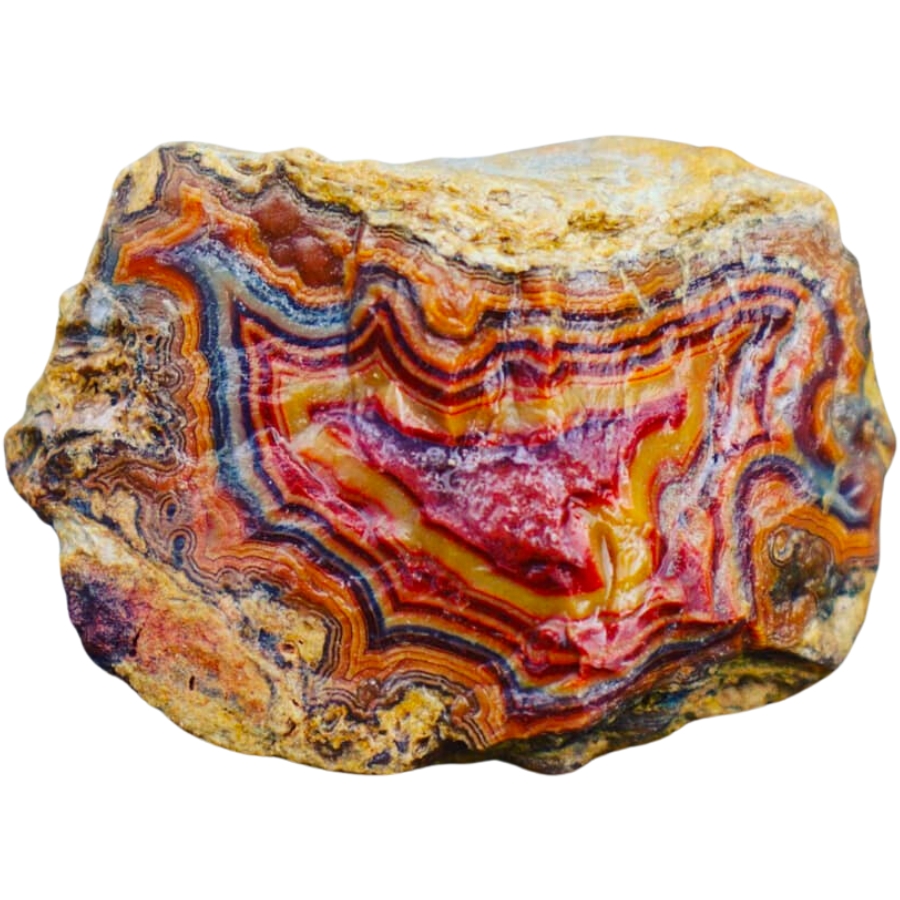
Known for its intricate patterns and bold colors, Fairburn agate is another fascinating type of agate. It usually has bands and swirls of different colors like red, yellow, orange, brown, and sometimes even pink or purple.
What’s special about these patterns is they often look like they’re in layers, creating a 3D effect. It’s like looking at a landscape made of stone.
It’s named after a place called Fairburn in South Dakota. This gives a clue about where it was first discovered.
People value Fairburn agate for the skill it takes to cut and polish it, which makes the patterns and colors really stand out.
Sagenite Agate
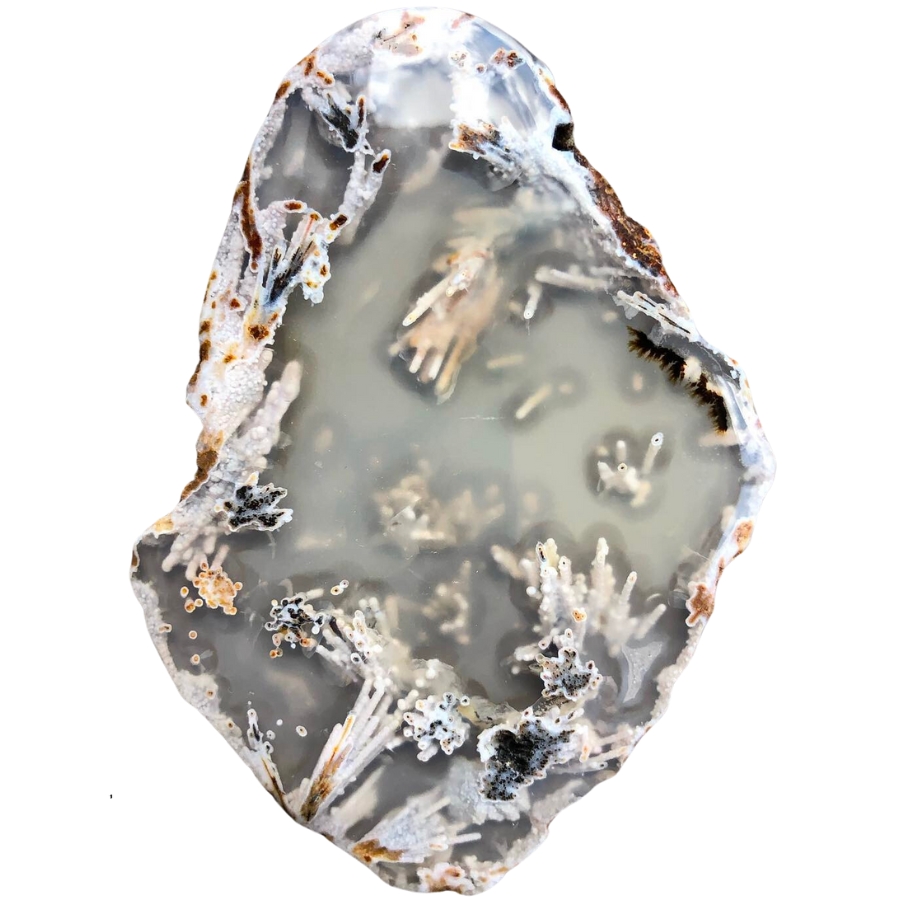
Sagenite agate has needle-like inclusions that look like tiny sprays of crystals inside it. They can be gold, silver, black, or even green, and they spread out in all directions, creating an amazing pattern.
The base of the agate is usually translucent, which lets you see these intricate needle patterns clearly.
These patterns are actually other minerals, like rutile or goethite, that get trapped inside the forming agate. These minerals grow in a crystal shape, looking like needles or hair.
Sagenite agate is often used in jewelry and other decorative items, with some people thinking that its needle patterns look like fireworks or starbursts.
Tree Agate
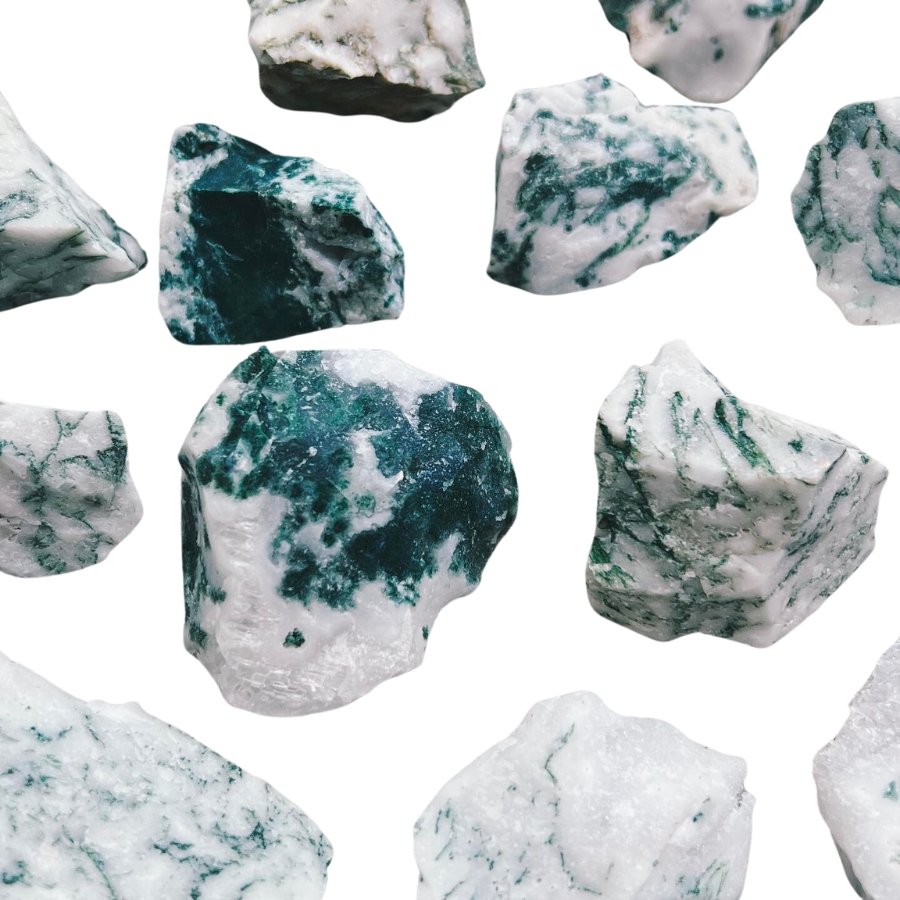
Tree agate, as its name suggests, looks like it’s got tiny trees or branches inside it. These tree-like patterns are usually green and spread out against a white or light gray background.
The green patterns aren’t actual trees, though. They’re made of minerals like chlorite or manganese.
Each piece of tree agate is different. You won’t find two that are exactly the same. It’s valued for its looks and it’s often used in jewelry and decorations.
The key factors in our recommendations are:
- The deep experience and understanding of our team about the area
- Recommendations from local groups and clubs
- How easy it is to get the a particular location
- Safety and potential hazards when collecting
- Weighing private and public locations
- The ability for both experienced and novice agate enthusiasts to find great samples
With these factors in mind we’ve been able to put together a fantastic list that just about anyone can use!
Kids. Beginners. Pros. Doesn’t matter. This book has become the go-to because it works for everyone.
Magy put it bluntly: “Identify rocks, crystals and minerals is so easy now!”
That’s not by accident, the photos are crisp, the callouts are simple, and the design is rugged enough to throw in a backpack without worrying. Whether it’s your first geode or your hundredth, this guide keeps the fun part simple: finding more treasures.
The Best Spots To Find Agates in Nevada
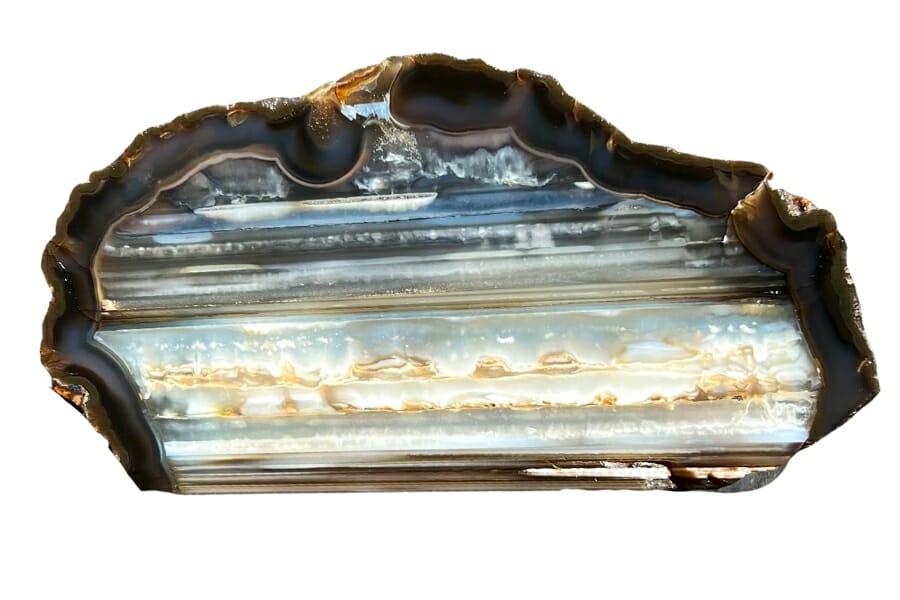
Nevada’s rough terrain is a treasure trove for agate fans. Although there are several places to find gems in Nevada, not all have agates. We’ll list the best places in Silver State to look for agates and have a fun adventure of beautiful finds!
Always Confirm Access and Collection Rules!
Before heading out to any of the locations on our list you need to confirm access requirements and collection rules for both public and private locations directly with the location. We haven’t personally verified every location and the access requirements and collection rules often change without notice.
Many of the locations we mention will not allow collecting but are still great places for those who love to find beautiful rocks and minerals in the wild without keeping them. We also can’t guarantee you will find anything in these locations since they are constantly changing.
Always get updated information directly from the source ahead of time to ensure responsible rockhounding. If you want even more current options it’s always a good idea to contact local rock and mineral clubs and groups
Gabbs Valley Range
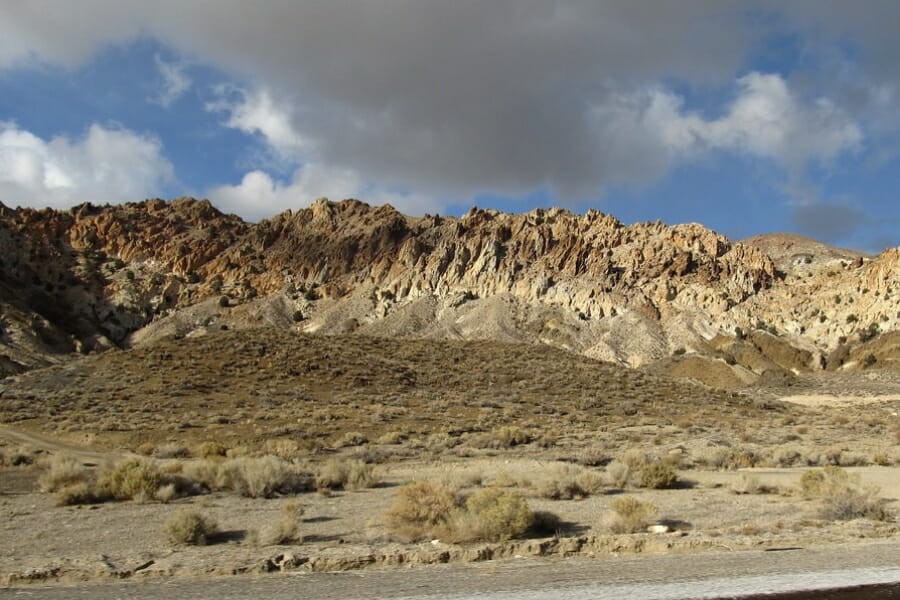
Nestled in the middle of Nevada, the Gabbs Valley Range is a rockhound paradise thanks to its unique geological features. This area’s rough mountains and changing landscape result from volcanic activity from long ago for agate to form.
One reason the Gabbs Valley Range is great for people looking for agates is that it isn’t very close to other places that people can easily get to, so it hasn’t been picked over as much.
Agates of all colors can be found here, some with bands and some without. They often sit on the surface, waiting for someone to notice them.
Where we found agates in the Gabbs Range Valley
Agates can be found in many places in Nevada’s Gabbs Valley Range. Check out the dry washes, river beds, and areas at the base of the mountains and hills. These are places where water may have moved or exposed the agates in the past or present.
Agate deposits can also be found near the foothills. These are usually brought to the surface by natural geological processes.
Lahontan Reservoir
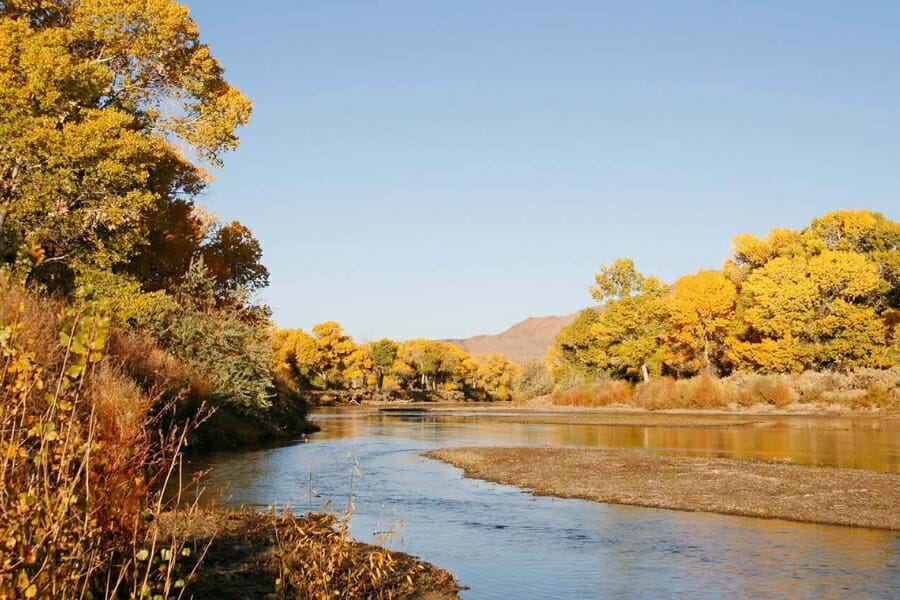
Lahontan Reservoir is in the desert basin of western Nevada. It’s a beautiful place where water meets dry wilderness. After the Carson River was dammed, a huge artificial lake was formed.
This lake is famous for its recreational activities like fishing, boating, and camping. Agate hunters are more interested in the area around the reservoir, though.
Changing water levels, especially during dry times, reveal large mudflats and submerged areas, giving rockhounds new places to look for rocks.
The location of the reservoir is important to its hidden value. The area was a hotspot for volcanic activity in the past, so there are so many volcanic rocks. Agates are often found in these rocks.
Where we found agates at the Lahontaon Reservoir
You have to be willing to explore and take some risks to find agates at Lahontan Reservoir. These stones are not all in one place. You can often find agates and other stones washed up on the beaches and banks that have been exposed.
Sometimes, when the water level is very low, dry lakes and riverbeds can be great places to look for agates. Agates may also be found where water has slowly deposited layers of gravel and sediment.
Pine Nut Mountain
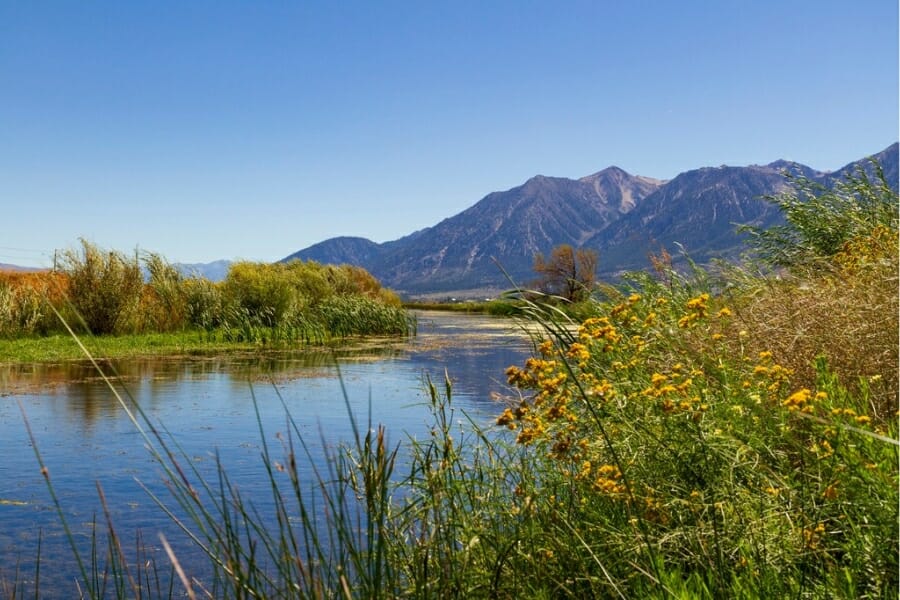
A range in western Nevada called the Pine Nut Mountains is a great place for rockhounds and adventurers alike. This rough landscape, with its few plants and famous pine trees, is a geological wonderland formed by volcanoes acting long ago.
Because of the area’s long history of volcanoes, many igneous and metamorphic rocks are often where you can find agates.
Pine Nut Mountains is a great place to find agates because it has a lot of different types of landscape, such as dry washes, steep ravines, and rocky outcrops.
You can find agates easily in these places because they are often formed in and around volcanic deposits.
Where we found agates in Pine Nut Mountains
The Pine Nut Mountains have several rocky outcrops and ravines, where agates may be found among other volcanic stones. Dry washes and stream beds at the mountain are also prime locations to search for agates.
Rock Creek Canyon
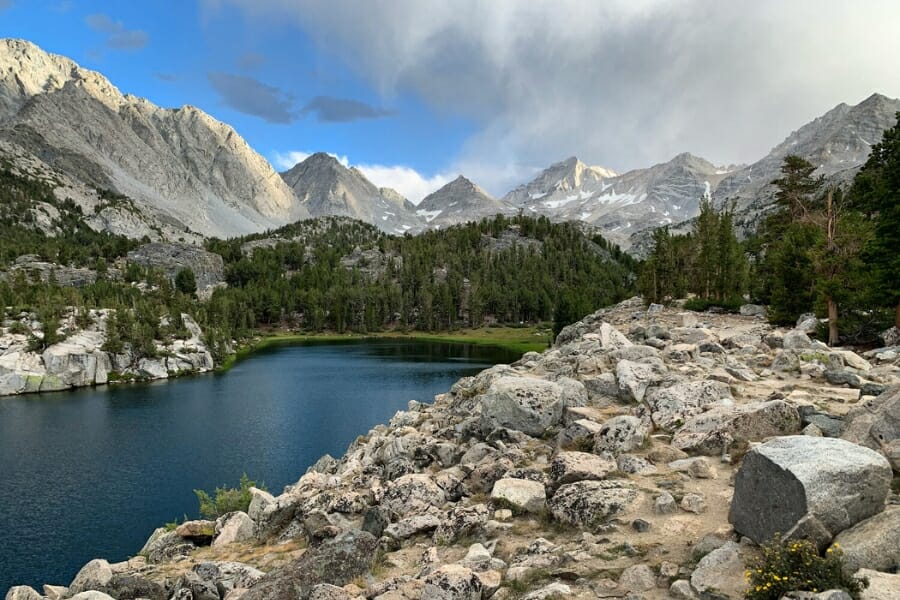
Rock Creek Canyon is a beautiful place with more to offer than just beautiful views and a peaceful atmosphere. It’s also a rockhounder’s dream, especially for those looking for agates.
Geological conditions in the canyon’s vast landscape make it a good place for many minerals to form, including the highly sought-after agate. These semiprecious stones were formed when lava from an ancient volcano cooled and settled.
This is a common event in the geological history of Rock Creek Canyon. The agates here can be a wide range of colors and patterns, which is fun for collectors. There are a lot of different kinds of agates, from banded to moss.
Where we found agates at Rock Creek Canyon
Hills and mountains can reveal mineral treasures, such as agates, through natural erosion. It can be especially useful to look at the bases of these geographical features, where things tend to gather.
Yucca Mountain
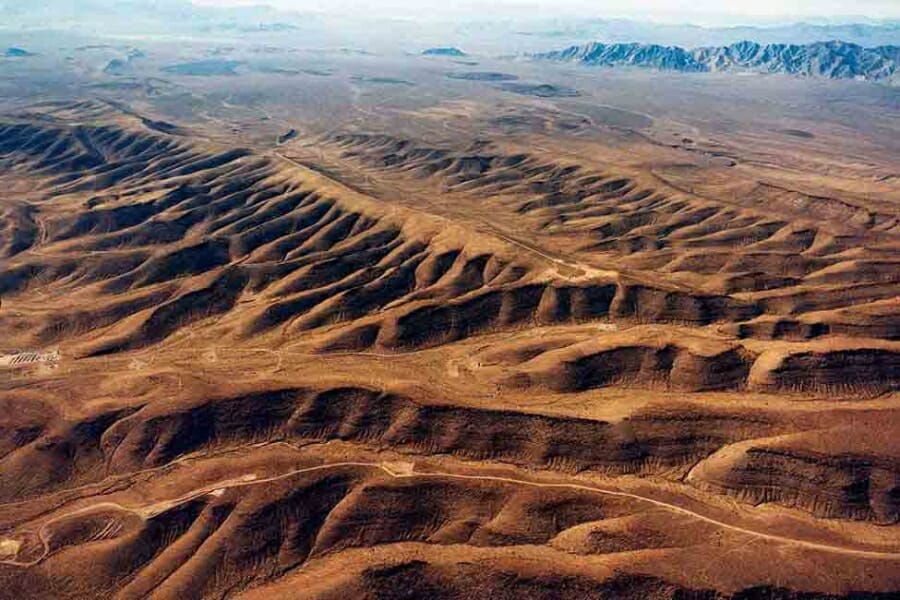
Yucca Mountain is mostly famous for being the site of a controversial plan to store nuclear waste, but it also has interesting geological features that mineral fans might be interested in.
This dry, isolated formation in the Mojave Desert was formed by volcanoes millions of years ago. Volcanic activity can create unique rock formations that may be good for minerals like agates to form.
Even though Yucca Mountain isn’t known for being a good place to find agates, the geological history of the surrounding area makes it possible that these semiprecious stones could be there.
Where we found agates at Yucca Mountain
When silica-rich lava hardens over time in certain conditions, it can turn into an agate. The rough landscape of the mountain, with its rocky outcrops and dry stream beds, is often linked to the discovery of agates.
Other Great Places To Find Agates in Nevada
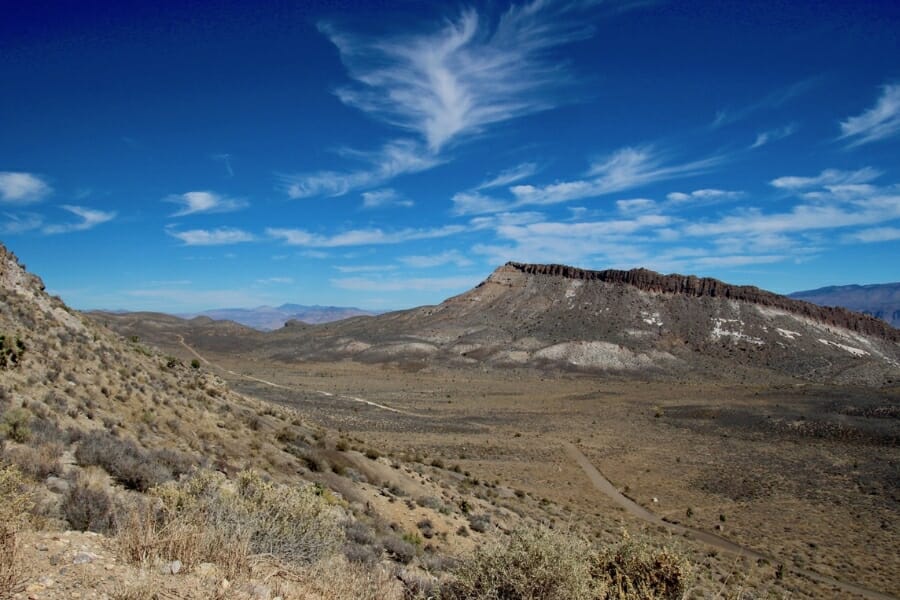
The different landscapes in Nevada hide many agate sites, and each one has remarkable rocks for rockhounds to find. We’ve already given you suggestions for the best places, but we’ll give you more recommendations to be successful!
Our detailed guide, organized by county, will reveal the state’s best-kept secrets.
Our recommendations by county
| County | Location |
| Churchill | Area surfaces of Bell Canyon |
| Churchill | Area slopes and area surrounding the Green Mountain |
| Clark | Along the North Shore road |
| Douglas | Mount Siegel |
| Elko | Area surrounding Jakes Canyon |
| Elko | Texas Spring Canyon area |
| Esmeralda | Monte Cristo Range, area draws, washes, and surfaces |
| Esmeralda | Palmetto Canyon, area surfaces |
| Esmeralda | Volcani hills |
| Eureka | Pinto Canyon |
| Humboldt | Amethyst Sage Mine |
| Humboldt | Rainbow Ridge Opal Mine |
| Humboldt | Agate Point area surfaces |
| Lyon | Fernley area, area on west flank of hills |
| Lyon | Wilson Canyon |
| Mineral | Along the shores of Walker Lake and area land surfaces |
| Nye | Agate Mountain |
| Pershing | Star Peak |
| Pershing | Trinity Peak |
| Washoe | Wall Canyon |
| Washoe | Donnelly Mine, veins in sedimentary rocks |
| Washoe | Sparks area draws, washes, fields, and land surfaces |
Additional areas you can find agates
It’s possible to find agates in the following places. We want to help you find these in Nevada because it’s a big state.
Lake shores
Agate collectors often find many of them along the shores of lakes. This is mostly because of the natural processes that happen there. Over time, lakes collect water flowing down from the nearby mountains and hills.
This water often contains many minerals, such as agates. The rocks that these semiprecious stones come from, like volcanic or metamorphic rocks, are hard and don’t wear away easily.
When rivers and streams flow into a lake, they slow down and leave behind heavier things like agates on the shore.
Mines and mine dumps
People looking for agates often forget about mines and mine dumps as safe places to find them. Agates are just one of the many geological treasures that are brought to the surface by mining operations while they are looking for specific minerals or ores.
When these things are no longer needed for the mine’s main purpose, they are usually dumped nearby, making the area easy for rockhounds to explore.
People who like to collect can find a wide range of items at these sites, and compared to natural geological sites, they usually don’t have to dig as deep.
Stream and creeks
Streams and creeks are some of the best and most exciting places for agate collectors to look. Minerals naturally flow down through these changing environments from their source points, usually higher ground or mountains.
Because they are hard, agates don’t wear away easily. They are carried along by the water flow and rest in gravel beds or along stream bends.
Over time, the constant flow of water washes away the softer rocks and sediment, leaving behind the tougher agates, which stand out because they are clear and have smooth surfaces.
Washes and ravines
Water and erosion have shaped washes and ravines over thousands of years, making them great places for people to find agates. Agates and other rocks and minerals move along these natural formations like conveyor belts.
Agates can be moved from their original volcanic or metamorphic sources to easier-to-reach places by water running down mountains and hills, especially after rain or snow melts.
During dry times, washes and ravines are easier to get through, revealing their rocky treasures.
Common Agate-Hunting Questions
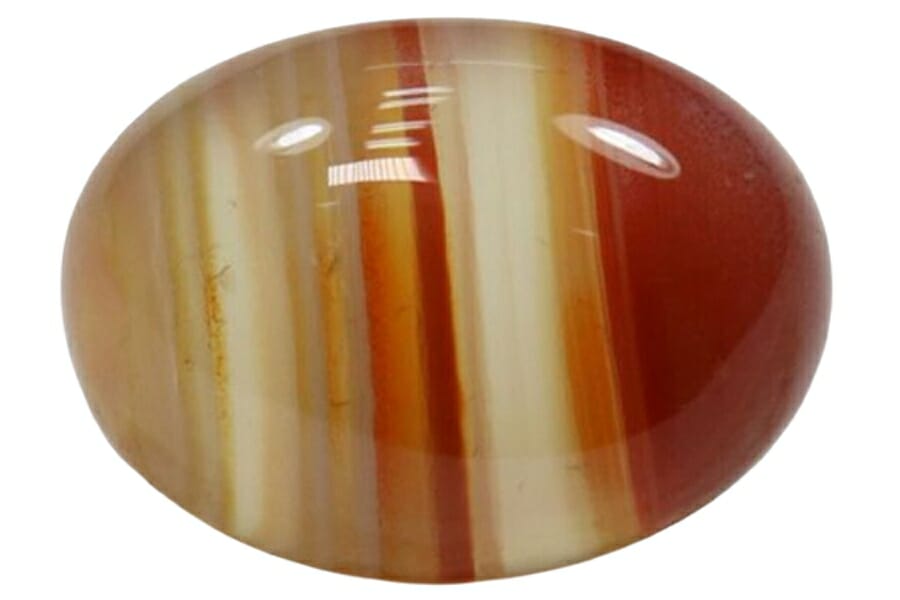
Most people ask this when they go to Nevada to look for agates.
Is it illegal to collect agate in Nevada?
Nevada doesn’t have any laws against collecting agates, but there are rules that collectors must follow to make sure they are doing it in a legal and ethical way.
The Best Places To Buy Agates In Nevada
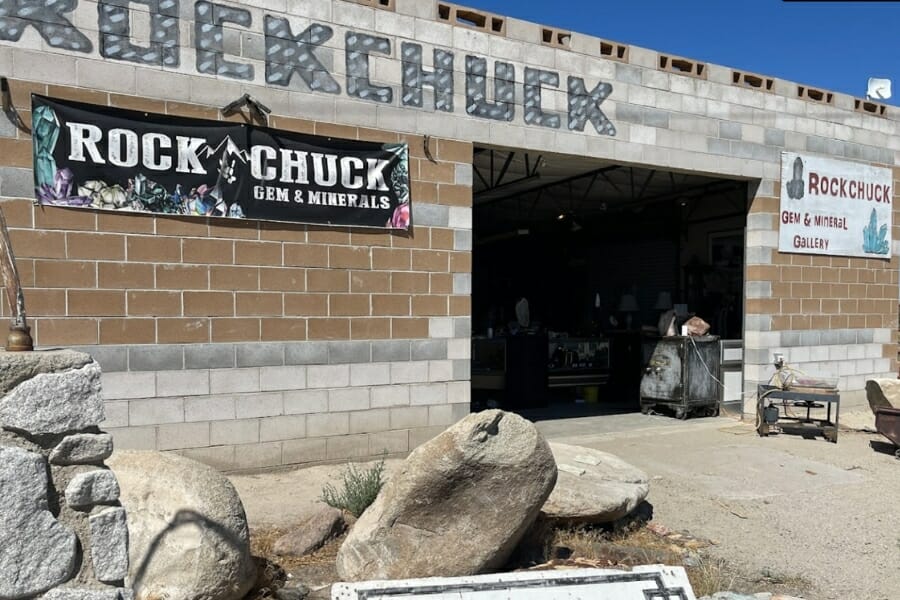
Some people don’t like going outside in the heat to look for agates. Sometimes you only need one piece to give as a gift or add to your library. You can easily find agates at these Nevada rock shops:
- Grammie B Rocks – 5560 Reno Hwy, Fallon, NV 89406, United States
- Jewelry & Minerals Las Vegas – 410 E Sahara Ave, Las Vegas, NV 89104, United States
- Luning Trade Post Rock Shop – 300 Plymire St, Luning, NV 89420, United States
- Rock Decor – 522 California Ave, Reno, NV 89509, United States
- Rockchuck Gem and Minerals – 4045 South Highway 95, Schurz, NV 89427, United States




